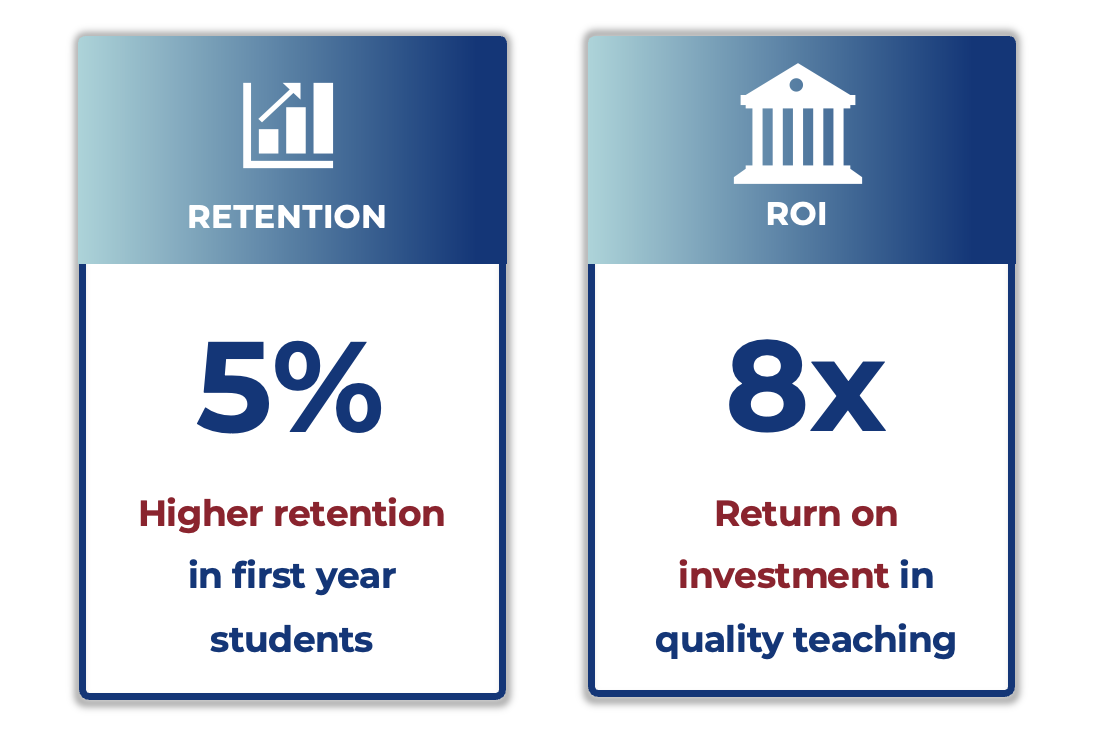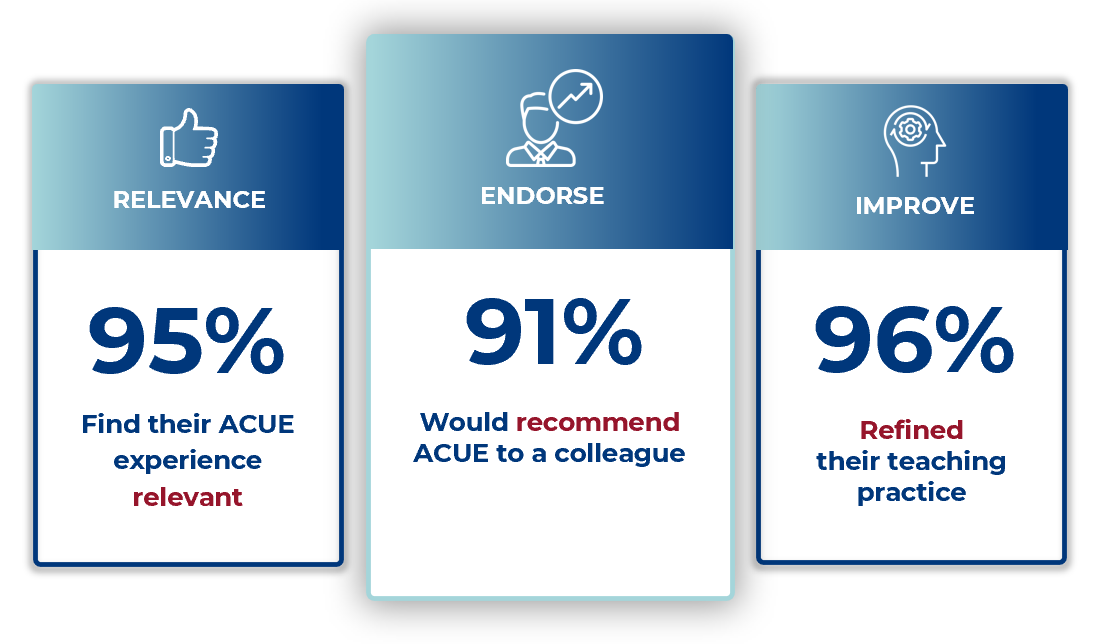The Return on Effective Teaching?
Student, Faculty, and Institutional Success

We’re not meeting the needs of many students. We know graduation rates are not where they should be. This situation is detrimental to students and institutions alike. Take, for example, a 2020 study noting that dropouts cost U.S. colleges more than $27 billion each year. That directly translates into cut programs, fewer professors, and less student support.
There are many levers that campus leaders can pull to help improve institution and student success, including advising, supplemental instruction, predictive analytics, and targeted financial aid. But the largest factor of all is too often overlooked: effective teaching.

The evidence is compelling. Institutions retain more students; faculty thrive; and students are more engaged, achieve higher grades, and stay enrolled thanks to great teaching. These are outcomes that the Association of College and University Educators (ACUE) has seen repeatedly when institutions invest in their faculty’s development.
Institutions Improve Retention and Return on Their Investment.
The University of Southern Mississippi (USM) initiated an institution-wide effort to enhance faculty performance by launching the ACUE Faculty Development Institute. USM wanted to improve DFW rates in gateway courses because of the possible scaled impact on first-year students who were experiencing familiar content in an unfamiliar context. USM and ACUE focused on improving teaching in gateway courses to boost retention and a sense of belonging in freshman students. Hundreds of faculty members participated, with one out of every four full-time faculty becoming certified in ACUE’s Effective Teaching Practice Framework. This resulted in a 5% increase in retention for first-year students who had at least 50% of their courses taught by a certified faculty member—along with an 8x return on investment. They cultivated a culture for learning that went beyond the student, driving goal achievement throughout the university.
The numbers show that having faculty members who are certified in ACUE’s Effective Teaching Practice Framework impacts institutions over time. As a professor of sociology and the former executive vice provost of The University of Southern Mississippi, Amy Chasteen explains, “It makes sense for the institution to not just invest in having a single instructor in every program, but to make sure we have as many people as possible with these skill sets so that students can get that cumulative impact as they go through their degree plan.”

Faculty Experience Improvement in Self Efficacy and Well-Being
Faculty are enthusiastic: 95% percent find ACUE courses relevant and helpful to their teaching, and 96% refined their teaching practice. Mindset research, funded by the Bill and Melinda Gates Foundation, further shows that faculty who are certified in ACUE’s Effective Teaching Practice Framework are better teachers. They’re using proven approaches with greater confidence and are more positive about their students’ abilities. It’s an entire shift in mindset. Many say it’s the best faculty development they have completed, and 91% recommend ACUE to colleagues.

Reflecting upon her experience with ACUE’s course design, Rebecca Karoff, associate vice chancellor for academic affairs at the University of Texas explains, “The research behind ACUE’s approach makes their courses deeply attuned to what faculty encounter in their increasingly diverse classrooms. ACUE addresses the inadequacy of pedagogical training faculty receive. Our partnership builds both confidence and a growth mindset among faculty and their students.”
Students Excel
Nationwide, the impact of faculty certified in ACUE’s Effective Teaching Practice Framework is remarkable. In Florida, Miami Dade College prioritized continuing education and development of their faculty, therefore they partnered with ACUE to ensure quality and scale their efforts. Miami Dade College instructors certified in ACUE’s Framework significantly improved grades across 220 Courses. At Broward College, faculty certified in ACUE’s Effective Teaching Practice Framework closed the achievement gap between Black and White students. Similar benefits were found for Latinx students in Arkansas after they partnered with ACUE through their focus on developmental education reform with the Start Strong to Finish organization. Grades and course completion rates are stronger at campuses in New Jersey and Nevada, with retention up and gaps narrowed in Mississippi. All told, an independent meta-analysis of 68 findings identified a positive, and predictable, “ACUE Effect.” These and other findings have led to major state- and system-wide ACUE initiatives in Texas, California, New York and elsewhere.
Teaching students and leading a college amidst all of today’s challenges can feel like impossible tasks. Effective teaching is a place to begin. The time is now. We have every reason to ensure great teaching and learning are happening in every class to help students succeed. It’s our mission. It’s what students, parents, and taxpayers expect. Plus, it’s one of the few things in our control to change.

Let’s Get Started
For nearly a decade the Association of College and University Educators (ACUE) has been higher education’s most trusted instructional partner, working with hundreds of institutions to prepare and certify thousands of professors and staff in evidence-based teaching practices. Delivered online, ACUE’s world-class programs are rich with instructional resources, demonstration videos, and guidance from subject matter experts. Informed by learning science, ACUE courses are both collaborative and facilitated, requiring implementation and reflection. ACUE pathways lead educators to the only national teaching certification endorsed by the American Council on Education—ACUE’s certification in the Effective Teaching Practice Framework.
Join the Teaching Excellence Movement and contact ACUE to establish a plan that drives your institution, faculty, and student success goals through great teaching.
This content was paid for and created by ACUE. The editorial staff of The Chronicle had no role in its preparation. Find out more about paid content.



